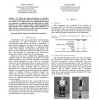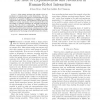102 search results - page 1 / 21 » Towards a design method for expressive robots |
HRI
2009
ACM
13 years 11 months ago
2009
ACM
Autonomous robots tend to induce the perception of a personality through their behavior and appearance. It has been suggested that the personality of a robot can be used as a desi...
IAT
2009
IEEE
13 years 11 months ago
2009
IEEE
— To explore the design of politeness in embodied conversational agents and social robots from the perspective of user studies, a case study based on a psychological experiment w...
IWC
2006
13 years 4 months ago
2006
Children's perceptions and evaluations of different robot designs are an important unexplored area within robotics research considering that many robots are specifically desi...
ICRA
2002
IEEE
13 years 9 months ago
2002
IEEE
Abstract— This paper presents the results of an experiment in human-robot social interaction. Its purpose was to measure the impact of certain features and behaviors on people’...
EUROS
2008
13 years 6 months ago
2008
This paper addresses the measurement of motion expressiveness in wheeled mobile robots. A neural network based supervised learning strategy is proposed as a method to fuse informat...


